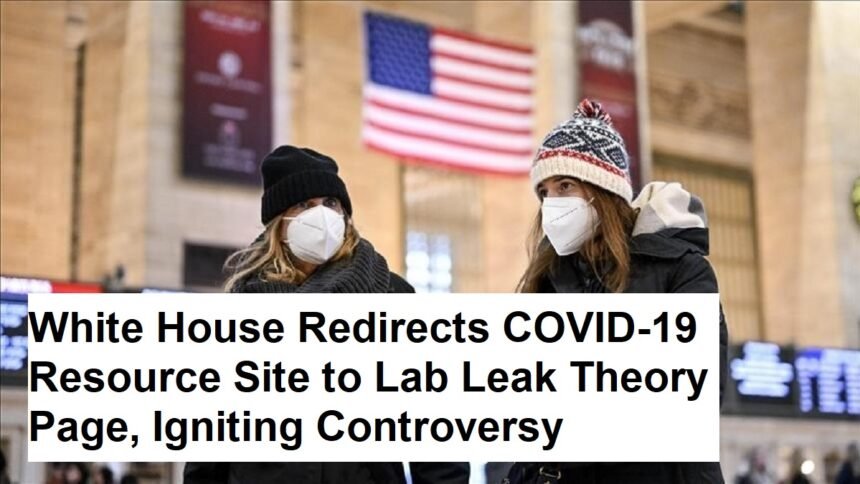In a move that has reignited global debate over the origins of the COVID-19 pandemic, the White House has redirected its federal COVID-19 resource portal, covid.gov, to a new website titled “The True Origins of COVID-19: Uncovering the Wuhan Lab Leak Theory.” Launched on April 18, 2025, the site—accessible at whitehouse.gov/lab-leak-true-origins-of-covid-19—publishes declassified intelligence reports, including a CIA assessment from January 2025 concluding that a laboratory accident in Wuhan, China, may have caused the virus’s emergence. The abrupt shift, which replaces a once-critical public health tool with politically charged content, has drawn fierce criticism from scientists, public health experts, and foreign governments, while fueling accusations of geopolitical opportunism.
From Public Health Hub to Political Battleground
During the pandemic, covid.gov served as a centralized hub for Americans to access testing sites, vaccination appointments, treatment options, and real-time data. Its replacement, however, focuses almost exclusively on advancing the lab leak hypothesis, which posits that SARS-CoV-2—the virus causing COVID-19—escaped from the Wuhan Institute of Virology (WIV), a high-security facility studying coronaviruses. The new site features redacted CIA documents, satellite imagery of the WIV, and timelines linking early cases to laboratory staff. A White House statement defended the move as “prioritizing transparency and accountability,” arguing that “the American people deserve answers about the pandemic’s origins.”
The CIA report cited on the site acknowledges that evidence remains circumstantial but states there is “moderate confidence” that a lab incident occurred between September and November 2019. This aligns with a 2023 FBI assessment but contradicts findings from other U.S. agencies, such as the Department of Energy, which previously labeled the theory as “low confidence.” Notably, the intelligence community has never reached consensus, with many experts still favoring zoonotic transmission (spillover from animals to humans) as the likeliest origin.
Global Backlash and Scientific Skepticism
The website’s launch has drawn sharp condemnation from China, which called it a “malicious fabrication” aimed at diverting blame for the U.S.’s pandemic failures. Foreign Ministry spokesperson Lin Jian accused Washington of “reviving Cold War-era propaganda tactics” and warned of “grave consequences” for bilateral relations. Meanwhile, scientists and public health leaders have criticized the administration for undermining trust in science. Dr. Maria Van Kerkhove, an epidemiologist who led the WHO’s COVID-19 response, tweeted: “Politicizing the origins debate distracts from preparing for future pandemics. This is dangerous.”
Critics argue that the lab leak theory, while plausible, lacks conclusive evidence and risks stigmatizing legitimate virus research. “This isn’t about science—it’s about weaponizing uncertainty for political gain,” said Dr. Peter Hotez, a virologist at Baylor College of Medicine. Others note that redirecting covid.gov erodes access to ongoing pandemic resources, such as updated vaccine guidance, even as COVID-19 continues to evolve.
Domestic Political Divide
Domestically, the decision has deepened partisan divides. Republican lawmakers, who have long demanded investigations into the WIV, praised the move as “long-overdue accountability.” Senator Marco Rubio (R-FL) called it “a victory for truth over China’s lies.” Conversely, Democrats and advocacy groups have accused the administration of exploiting trauma for geopolitical leverage. “This isn’t transparency—it’s sensationalism,” said Representative Pramila Jayapal (D-WA). “Millions still rely on covid.gov for health information. Erasing that to score points is reckless.”
The shift also raises ethical questions about the role of government platforms. By repurposing a public health website into a politically contentious archive, the White House risks conflating public service with propaganda, potentially eroding trust in federal institutions.
Broader Implications for U.S.-China Relations
The website’s launch coincides with escalating tensions between the U.S. and China over trade, Taiwan, and technological competition. Analysts suggest the move is part of a broader strategy to pressure Beijing into accepting international investigations into the WIV—a demand China has repeatedly rejected. “This isn’t just about COVID-19,” said Bonnie Glaser, a China expert at the German Marshall Fund. “It’s about framing China as a irresponsible actor on the global stage.”
However, the approach risks backfiring. By unilaterally publicizing intelligence findings, the U.S. may alienate allies who favor collaborative, evidence-based inquiries. The European Union, for instance, has cautiously supported further investigations but emphasized the need for “apolitical scientific rigor.”
What’s Next?
The Biden administration faces mounting pressure to restore covid.gov’s original functions or create a separate platform for pandemic resources. Meanwhile, the lab leak site is likely to become a flashpoint in the 2026 midterm elections, with candidates leveraging the issue to rally their bases.
Globally, the controversy underscores the challenges of disentangling science from geopolitics. While the origins of COVID-19 remain unresolved, the weaponization of the debate threatens to hinder future pandemic preparedness and international cooperation. As the World Health Organization renews calls for unbiased research, the world watches to see whether truth—or ideology—will prevail.
For now, the redirected website stands as a stark symbol of a pandemic era defined as much by discord as by disease.












